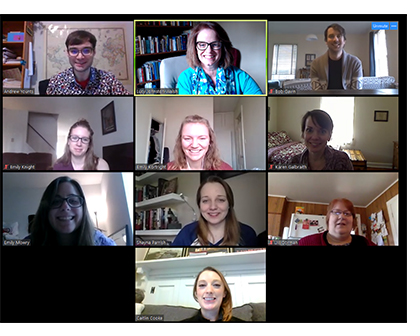CHILDREN’S ADVOCACY CLINIC STUDENTS CONTINUE ADVOCACY FOR FOSTER CHILDREN DURING PANDEMIC
April 1, 2020 — The COVID-19 outbreak has impacted everyone. For foster children in Pennsylvania, the effects have been especially profound.
Children receiving mental health treatment can’t see their therapists. Reunification visits become more difficult to schedule. Children cannot transfer to new shelters. Foster parents suddenly teaching at home lack the educational resources children with special needs receive at school.
Students in Penn State Dickinson Law’s Children’s Advocacy Clinic represent foster children as part of their experiential learning. These students have launched a research project examining the many ways the pandemic affects their clients.
 Following Penn State’s decision to move to remote course delivery for the remainder of the spring semester, Dickinson Law students cannot appear in court, but “we still have a legal obligation to provide the best representation we can to our clients,” says Professor of Clinical Law Lucy Johnston-Walsh '97, director of the Children's Advocacy Clinic and the Center on Children and the Law.
Following Penn State’s decision to move to remote course delivery for the remainder of the spring semester, Dickinson Law students cannot appear in court, but “we still have a legal obligation to provide the best representation we can to our clients,” says Professor of Clinical Law Lucy Johnston-Walsh '97, director of the Children's Advocacy Clinic and the Center on Children and the Law.
That sparked the idea for the research. “We want this project to raise awareness of an impact of the pandemic people aren’t thinking about,” she says. “We wanted to know how widespread the effects would be and how deep they would go. We started identifying areas in which the pandemic was impacting our clients.”
Students broke down six areas of concern for foster children, ranging from education to facilities and homes to medical and mental health. They will write weekly blogs posted on Fridays detailing what they learn, starting with an introductory post by second-year Dickinson Law student Emily Kortright '21 presenting an overview of the project.
Unique problems facing foster children
Obvious issues include shutting down courts except in case of emergency and cancellation of school, which is impacting children all across the commonwealth. Foster children face greater technology challenges than others.
“It’s easy for many of us to work from home,” Kortright explains. “We get on our laptops and call people. We have all these ways to communicate. Foster children do not.”
Many shelters do not allow children to use WiFi, so they can’t participate in Zoom cyberlearning sessions with their teachers. Unless they pay for their own cell phones, they can’t call the Dickinson Law students, their therapists, or others.
Kortright notes foster children in Cumberland County have judicial conferences (less formal meetings with the court) every six months in between when they have scheduled court proceedings—facetime that can resolve conflicts before they happen. These sessions, too, have been suspended. The courts are handling emergency hearings only and adjudicatory hearings.
Other unanticipated client issues have arisen, such as securing transportation for a client being removed from a facility and finding places to move children amid social distancing. Legal remedies require creative thinking. “One of the students has a client involved in the child welfare system because of truancy. Now there’s no in-person school, so truancy concerns now seem irrelevant,” says Johnston-Walsh.
The mental health effects on children during the pandemic could be devastating, too. “Kids really need socialization, and they might not get any socialization without school. They’re cut off from friends and therapists, and loved ones can’t visit. These are things people don’t immediately think of when they hear about the pandemic,” Kortright says.
For her part of the project, third-year Dickinson Law student Emily Mowry ’20 has been researching education, including how school closures affect children, foster care, and biological families beyond daily learning. “A lot of these children rely on access to free meals at school, not just lunch but breakfast as well,” she says. “There’s also the lack of physical activity—they get physical education at school but don’t necessarily have the opportunity to exercise where they’re living.”
Inspiring community aid and compassion
Mowry has found a lot of information on Twitter, where she follows child welfare professionals, clinical professionals, and organizations working on behalf of children. Many have published useful guides or resource hubs.
In addition to Mowry and Kortright, other participants in the Children’s Advocacy Clinic project are third-year Dickinson Law students Jill Gorman ’20 and Bob Gavin ’20, and second-year Dickinson Law students Caitlin Cooke ’21 and Jake Younts ’21. Social workers Shayna Parrish from Shippensburg University and Emily Knight from Millersville University also are assisting.
Ultimately, everyone involved wants to highlight the massive challenges facing foster children during the pandemic. They hope their research prompts people to reach out with offers of assistance or even a friendly “how’s it going” to foster families during a hard time.
“The pandemic has brought up new conflicts for foster kids, exacerbating the issues they already had,” says Kortright. “They’ve revealed deficiencies in the system that were there before and might be worse now. Even the littlest things could help these kids, such as donating SIM cards for cell phones or providing over-the-phone therapy to help mitigate these problems.”
Subscribe to the Childrens' Advocacy Clinic blog to stay up to date on the students’ research efforts.